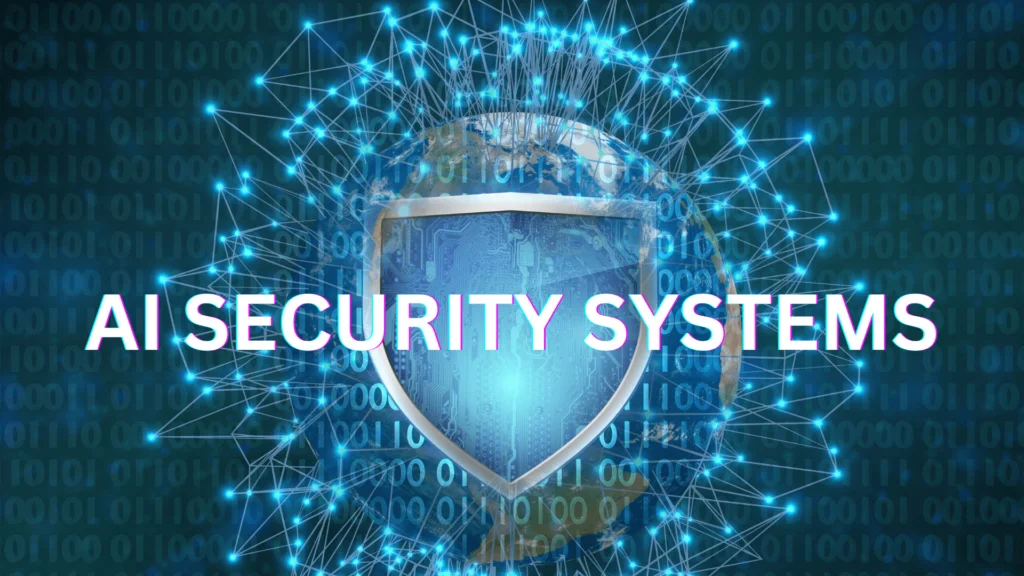AI Security Systems: The Future of Cybersecurity
Security Systems in General
Today, hackers and defenders are locked in a race of wits. Every year hackers and crackers become smarter and new age security measures fail to stand the test. Introducing AI security systems–the new horizon of protecting our virtual space. These advanced security systems empower the use of artificial intelligence to enhance the capabilities of recognizing and combating cyber threats giving a better and more efficient way of protection.
This blog insights into the uses of AI in cybersecurity, how AI threat detection is altering the landscape, the advantages of AI in cyber protection, the benefits of AI in cybersecurity, and anticipating the trends in AI security. Just when you thought technologies can’t get any better, AI is going to prove otherwise.

The Emergence of AI Security Systems in Cybersecurity
As threats in cyberspace become compounded, it is important to embrace intelligent security systems. AI security systems learn from the data while traditional systems employ predetermined rules to identify the hostile activity. These systems do not merely execute successive orders; instead, they discern patterns, anticipate threats as well as adapt to new forms of threats.
How AI Learns and Adapts
What makes AI so powerful in cybersecurity is the ability to detect patterns that are out of the ordinary that would never be detected by traditional software. This dynamic adaptability is a major boon for organizations as it allows them to outmaneuver cyber criminals at their own game.
Real-life Instances of AI Learning
For instance, an AI of an enterprise environment may detect that a specific user logs into a network during 9 AM in the morning. It can identify itself as suspicious, if the user of that account logs in at 2 AM, even if he is not an intruder on the network. Such preventive measures help organizations to avoid controllable risks and prevent them from becoming greater dangers.
Security Threat Detection with the Help of AI
AI threat detection is one of the most interesting developments in the world of cybersecurity. When it comes to artificial intelligence, security systems are capable of scanning large volumes of data for threats in real-time. In contrast to conventional threat identification, which may only point to threats previously identified, AI employs machine learning algorithms that can find such threats that have not been previously encountered.
The Power of Machine Learning Algorithms
Think of it, AI systems identifying invalid logins or suspicious network traffic. The system is not dependent on a complete manifestation of an attack in order to respond and minimize the damage. You can hire and fire your team, but this system is always awake and learning through its experiences or threats posed to it.
Behavioral Analysis as a Component
Behavioral analysis is one of the main aspects of threat detection using AI. If an AI system knows what the typical user performs, it can distinguish abnormal actions, which can be a sign of an attack. For example, if an employee who is authorized to work only on several documents tried to download several thousands of documents it can be considered as suspicious actions.
Continuous Vigilance
To better understand AI systems, think of them as observant guards who patrol a network and look for something wrong. These systems do not get weary or do not rest; they continue to operate round the clock. You can employ and dismiss your security team, but the AI system stays awake with experience and competition from every phase it comes across.

Benefits of AI in Cybersecurity
The opportunity for implementing AI technology in cybersecurity is greatest and inclusive. Here are just a few reasons why AI is becoming indispensable in this field:
1. Faster Detection: AI provides results at the speed of light and foresees threats as soon as they emerge. Hence, human response times can never match such standards.
2. Adaptive Learning: AI security systems are not rule-based, like in human-developed security systems. They adapt to various attacks and always enhance measures of protection.
3. Reduced False Positives: False alarms are minimized in the use of AI since it differentiates between normal behavior and abnormality. This means fewer interruptions and more genesis of accurate alarms.
4. Proactive Defense: While traditional systems respond to threats and security breaches after occurrence AI gets ahead of them, preventing any harm.
To sum it up, AI adds the factors of dynamism, precision, and detached reason that turn cybersecurity from a reactive process into a proactive one.
Trends in AI Security: What’s on the Horizon?
Given the dynamic nature of AI technology, the possibilities of its adeptness in the field of cybersecurity are vast. Here are some trends in AI security that are shaping the future:
1. AI-Powered Incident Response: Cybersecurity incidents are getting more response involvement from artificial intelligence. By automating the response process, AI can prevent threats from spreading as they do in human teams, thus minimizing the damage and returning the systems in a record time.
2. AI and Biometrics: It is augmenting the biometric system by using fingerprints, facial, and even the behavioral recognition system. This combination fosters stratum security that is difficult to penetrate.
3. AI Threat Intelligence Sharing: In fact, organizations are now able to share AI threat intelligence through the help of collaborative AI models. With such attacks being analyzed for different industries, AI systems are enabled to adapt to other types of attacks.
4. Generative AI and Security: How has generative AI affected security and has altered the security paradigm? To a large extent, generative AI is revolutionary in creating content, however, it is a double-edged sword. On the one hand, it enables organizations to rehearse cyber threats to improve protection measures. On the other, cybercriminals employ it for the production of phishing attacks, deepfakes, and malware. It is for these reasons that AI security systems must adapt in order to address such generative threats.
The above trends demonstrate how beneficial AI is to our societies, especially in enhancing the safety of our online environments. With time, one can envisage even more innovation regarding the usage of AI technology in the context of cybersecurity.
Hands-On Artificial Intelligence for Cybersecurity: A Practical Approach
To cybersecurity practitioners, artificial intelligence for cybersecurity work entails applying the technology tools in day-to-day operations. From scanning the network for an activity to identifying the next likely cyber attack, artificial intelligence gives workable solutions to improve the performance of human components.
Let’s take a practical example: a security operations center (SOC) dealing with alert overload. Manually sorting through these is cumbersome and could take a lot of time since one is likely to make a lot of mistakes. However, an AI-powered system can rank threats according to the severity of the risk, ensuring that SOC analysts have the material to focus on the matters that require immediate attention.
This is the beauty of AI security systems because it incorporates human mastery and AI prowess. It’s not about replacing people—it’s about helping people be more efficient at their work.
Challenges and Ethical Considerations of AI Security Systems
Of course, not everything is so rosy with all the benefits that AI provides in terms of cybersecurity, there are problems too. A common fear is that AI may be turned against us. In the same manner, the same capabilities offered by AI can also be used strategically by hackers and black hats to stage even more complex attacks.
There are also some of the ethical issues that can be raised concerning data privacy. AI systems as we know have to rely on big data to be able to perform their functionalities. It is equally important to ensure that this data is processed responsibly so as not to contravene the user’s privacy.
The Development of AI Security Systems
Every year, AI is turning into a more significant aspect of cybersecurity as its importance increases. We are approaching the era in which most of the security tasks will be handled by AI systems, and human beings will be responsible for decision-making only.
But it is not just a question of preventing the attacks – it is a question of creating an adaptive security environment that can predict and counteract in real time. Traditional security systems do not hold up against ever-changing cyber threats but AI security systems fill this gap. The advancement of cybersecurity is not solely in creating capabilities to defend against attacks but in developing systems capable of anticipating threats and responding to them in real time. While traditional security systems are overwhelmed by new forms of threats, there are AI security systems intended to address this issue.
To see other software areas where AI has transformed, you can learn more here.
Conclusion: Embracing AI Security Systems
The integration of AI in cybersecurity is beyond just a trendy word – it is the way forward to the future. Presently, the means of threat detection, threat intelligence, and threat adaptation are revolutionizing the protection of digital assets. In today’s highly interconnected world, businesses, governments, and everyday people must adopt AI safety measures to be able to protect themselves.
When AI is applied to security services, it is not only guarding against the current threats, it also protects against future ones. Thus the future of cybersecurity has arrived with the help of AI.